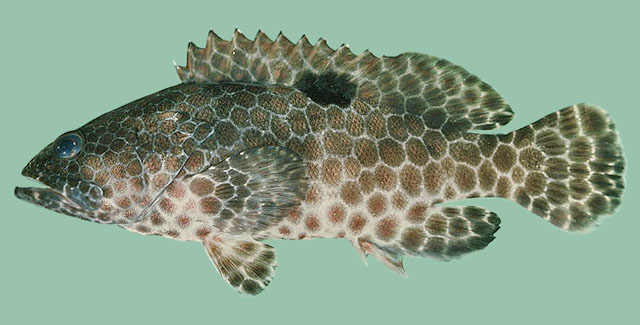| Epinephelidae (Groupers) |
| 54.9 cm TL (male/unsexed); max.weight: 3,794.0 g |
|
reef-associated; marine; depth range 0 - 30 m |
| Indo-West Pacific: Natal, South Africa to the central Pacific. Not known from the Red Sea nor Persian Gulf. |
|
Dorsal spines (total): 11-11; Dorsal soft rays (total): 14-16; Anal spines: 3-3; Anal soft rays: 8-8. A single large black blotch along middle of dorsal fin base (Ref. 37816), which can be turned off (Ref. 48635); further characterized by head, body and fins having numerous close-set polygon shaped dark brown spots; broad zone along side of body with ctenoid scales, cycloid scales elsewhere; body with auxiliary scales; greatest depth of body 2.9-3.4 in SL; rounded caudal fin; short pelvic fins, 2.0-2.6 in head length (Ref. 90102); head length 2.2-2.4 in SL; flat or slightly concave interorbital area; rounded preopercle, serrae mostly covered by skin; straight or slightly convex upper edge of operculum; subequal posterior and anterior nostrils; maxilla reaches to or past vertical at rear edge of eye; 3-5 rows of teeth on midlateral part of lower jaw, inner teeth about twice as long as outer ones (Ref. 89707). |
| Occur in outer reef flats and shallow lagoon (Ref. 37816). Reported to be taken in a trawl, thus presumably caught somewhat deeper than 7 m. Also reported to occur in reefs at a depth of about 30 m (Ref. 5213). Because of its small size and apparent rarity, it is of little or no commercial importance. Solitary (Ref 90102). |
|
Least Concern (LC); Date assessed: 15 January 2018 Ref. (130435)
|
| reports of ciguatera poisoning |
Source and more info: www.fishbase.org. For personal, classroom, and other internal use only. Not for publication.

